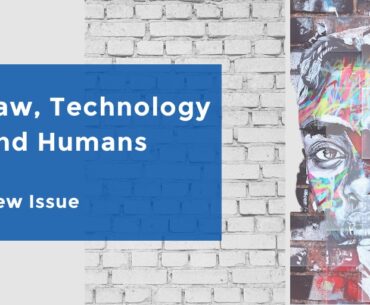In the first seminar of our QUT Global Law, Science and Technology Seminar Series, co-hosted by the Australian Centre for Health Law Research (ACHLR), Associate Professor Bernadette Richards explored the challenges of trustworthy data governance. Abstract: Technology is empowering advances in healthcare, extending beyond the clinical interface to the…
ACHLR 9th Annual Public Oration
The Australian Centre for Health Law Research (ACHLR) hosted their 9th Annual Public Oration on March 29, 2022. This year’s oration, New Voluntary Assisted Dying Legislation, was delivered by Andrew Denton and Justice Peter Applegarth (Judge of the Supreme Court of Queensland and chairperson of the Queensland Law Reform Commission).…
Law, Technology and Humans – Call for Papers 4(2) 2022
Papers for consideration in Volume 4 Issue 2 are now invited. Volume 4(2) will be published in November 2022. Preference will be given to research and scholarship that: Challenges and critically examines the promises and perils of emergent technologies; Engages with the futures (and pasts) of law, technology…
Law, Technology and Humans accepted for indexation by Scopus
The Law, Technology and Humans journal has been accepted for indexation by Scopus after only two years of publication. Scopus is the world’s largest abstract and citation indexing database of peer-reviewed literature: scientific journals, books and conference proceedings. For inclusion, publications must adhere to specific publishing requirements that…
Law, Technology and Humans: Call for Papers
Symposium Jurisprudence of the Future 2022 Science fiction is the bubbling crucible from which technological society imagines its future. For legal scholars concerns with nomos, with how narrative, story and myth, forms normative universes, science fiction is particularly important. This symposium, edited by Associate Professor Mitch Travis (University…
New book published: International Perspectives on End-of-Life Law Reform
Much has been written about whether end-of-life law should change and what that law should be. However, the barriers and facilitators of such changes – law reform perspectives – have been virtually ignored. Why do so many attempts to change the law fail but others are successful? International…
The TRIPS Waiver: Intellectual Property, Access to Essential Medicines, and the Coronavirus COVID-19
The TRIPS Waiver: Intellectual Property, Access to Essential Medicines, and the Coronavirus COVID-19 Research Symposium, hosted by the Australian Centre for Health Law Research (ACHLR) and co-ordinated by Professor Matthew Rimmer, was held on the 10 December 2021. The symposium was part of ACHLR’s research activity in respect…
Wills formalities in the 21st century – Promoting testamentary intention in the face of societal change and advancements in technology
In our fifth QUT Global Law, Science and Technology seminar series for 2021, co-hosted by the Australian Centre for Health Law Research (ACHLR), Professor Bridget Crawford investigated the purposes of traditional will-making requirements and their continued vitality in the context of remotely witnessed wills. Abstract The COVID-19 global…
Law, Technology and Humans Volume 3 Issue 2
A new issue of Law, Technology and Humans has been published. This issue of Law, Technology and Humans contains a commentary produced by the artificial intelligence (AI) system GPT-3. A project undertaken by Benjamin Alarie and Arthur Cockfield is, as far as the editors can establish, the first…
This week (October 25-29) is International Open Access Week
So what is open access? Open access (OA) is a set of principles and a range of practices through which research outputs are distributed online, free of cost or other access barriers. Through licensing via an open license (usually a Creative Commons License), freely available outputs can also…










